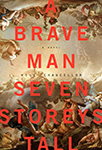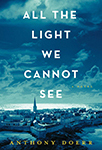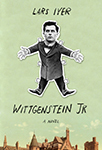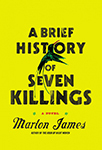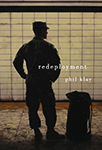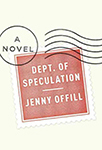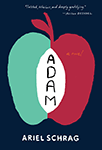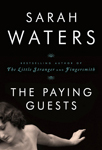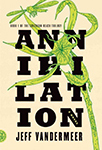by Jesse Ball
30% OFF at Powell’s »Stephen Marche: The life-and-death struggle in my soul between Sarah Waters’s The Paying Guests and Will Chancellor’s A Brave Man Seven Storeys Tall has raged for a week. It’s a classic battle between two visions of the novel: one that lives and breathes comfortably in the tradition; the other that stresses novelty. In The Paying Guests, we have a Man Booker Prize contender, with the all the attributes that go into that contention: English people, restraint, the myriad details of an “inner life,” naturalism, negotiations with the wounds of history, and sheer bulk. A Brave Man Seven Storeys Tall is an altogether rarer beast: a slim and elegant American novel of ideas. Between the poles of these two aesthetics, one could comfortably drive almost every novel published in the past year.
Waters has been a Booker finalist thrice before, with The Little Stranger, The Night Watch, and Fingersmith. The Paying Guests is a much quieter, more restrained novel than any of those works. It is, as they say, “atmospheric.” The atmosphere in question is London in 1922, which is a somewhat grimmer setting than those of the previous books. A rising middle class spreads a mild awkwardness and a mild economic prosperity to the mild suburban stretches of London. The food is charmless.
The Paying Guests is the kind of world in which women have conversation like the below:
“What a thoroughly nice woman you are, Mrs. Barber,” she said.
That made Mrs. Barber look up with a smile of surprise. But she winced, too. “Oh, don’t say that.”
“Why not?”
“Well, because some day, you’re sure to find out that it isn’t true, and then you’ll be disappointed in me.”
Frances shook her head. “I can’t imagine it. But now I like you more than ever! Shall we be friends?”
Mrs. Barber laughed. “I hope so, yes.”
Stuff happens in The Paying Guests, don’t get me wrong: secrets revealed, friendships started. A plot eventually churns, like a steam engine, out of the station. But the basic truth is that you should read The Paying Guests if you want to be with the two women above for 20-odd hours of your life.
Will Chancellor’s A Brave Man Seven Storeys Tall is a first novel, and an exciting one. It has almost no atmosphere. It has thoughts and cities and art and the search for a missing boy instead. Owen Burr is a six-foot-eight Stanfordian who is a water polo champion headed to the Olympics. His father is a classics professor who once wrote a dictionary of hapax legomena, “words occurring only once in the written record of an ancient language.” Owen loses an eye in a pool mishap, and the loss destroys his chances as a water polo Olympian. He channels his furious ambition immediately into art.
Owen heads to Berlin, where all sorts of wickedly ambitious people make art, and men with eyepatches are not particularly worthy of comment. Then Owen disappears, and his doctors point out that his mental health, which has never been entirely stable, will be affected by his accident; he may be suffering from “phantom eye syndrome.” Owen’s father quests for his lost boy, although his methodology differs somewhat from, say, the strategy of Liam Neeson’s character in Taken. It involves a series of lectures. Ideas are as vivid as sensations in A Brave Man Seven Storeys Tall:
Since Owen’s disappearance, the professor had penned a liminal interpretation of profit and loss for Modern Socialism and posted an alternative interpretation of Lacan in the New Left Review—which S_____ Ž_____ himself had almost praised in a letter to the editor.
If you do not know what the S and the Ž stand for in the above quote, then do not bother with A Brave Man Seven Storeys Tall.
Despite their colossal differences, both The Paying Guests and A Brave Man Seven Storeys Tall investigate a basic emotional reality that is at the core of literature: They are books about escaping your parents. As all bookish children know, escaping your parents is one of the main functions of literature. It is a great gift: You can be in the same house with your folks and a million miles away at the same time.
If I pick The Paying Guests, I do so only because it makes that escape a little easier. As fascinating as A Brave Man Seven Storeys Tall is, and as gutsy a narrative, The Paying Guests has that sure hand of 19th-century character development and plotting which is just so reliable. It’s a smooth burn that builds—fake people you don’t want to leave, in situations you need to see the end of. You find yourself with nowhere to put down the book. That’s tough to beat.
John: Well…poop.
There is no book released this year that I’ve talked about more, recommended more, or thought more highly of than A Brave Man Seven Storeys Tall. At the risk of self-aggrandizement, if there is a bandwagon for this novel, I built that fucker, threw the yoke over my own shoulders, and started pulling.
I did it for two reasons. One is that, as I say in that appreciation linked to above, I fell in love with the book. There is a scene early on concerning the water polo match in which young Owen loses his eye that made me grin like a dummy immediately before filling me with dread. The book just felt alive from the first word to the last. It seemed utterly specific to one view of the world, and I was so pleased to come across it that I had to tell as many other people as possible.
The second reason is that it was apparent to me that A Brave Man Seven Storeys Tall was among the multitude of literary fiction that comes out every year and is mostly ignored, for no particular reason other than that there’re lots of books, lots of good books, and that there isn’t space for all of them in the conversation. As the proud author of a commercially unsuccessful (an understatement) novel, I’m certain that some of my motive was to exorcise my own frustrations.
And I’m fortunate enough with this role and with “The Biblioracle” (my weekly column for the Chicago Tribune book section, Printers Row Journal) to have a small platform on which to stand and shout about the books I think the world needs to pay more attention to. Maybe it helps. As of this writing, if you look at the “Customers Who Bought This Item Also Bought” feature for A Brave Man Seven Storeys Tall on Amazon, you’ll see that all of the first five are Tournament of Books competitors.
That said, I’m no Oprah, or Mark Zuckerberg, or New York Times review, so my influence is obviously limited. Amazon doesn’t tell us how many books those also-boughts represent.
I hope what I’m able to do has helped. I want to read another Will Chancellor novel someday. It’s hard to write novels, and my experience is that having the freedom to work on them, freedom which sometimes comes in the form of material security, makes it a little easier.
I’ve read other Sarah Waters novels, but I did not read this one. She is a top pro, has figured out her thing, and knows how to do it incredibly well. I didn’t want to experience any conflict over the matchup. This way, my heart is pure, my loyalties clear.
Poop.
Kevin: This is tough for me to tell you, John. The Sarah Waters book is pretty good.
As you say, however, so is A Brave Man Seven Storeys Tall. 20 years from now, if I am in a conversation with someone about the works of Sarah Waters, I might struggle to remember exactly what happened in this one. I liked it very much. I have already recommended it to several people. The reason it is easy to recommend is that it is like a lot of novels that lots of people like. That sounds flippant, but it’s a sincere compliment. If that were easy to do, everyone would.
What I do mean is to show how much A Brave Man Seven Storeys Tall stands out on the list of novels I read last year. You pressed it into my hands and I’m so glad you did. It is somehow both peculiar and accessible. Unique and familiar. It is weird but not experimental. These are contradictions that require explanations, but I am at a loss to provide them. Here is one thing I remember so much about reading it. This is a book with two principal characters. The first is a giant, possibly unstable, one-eyed water polo player who disappears from his life to go on an adventure throughout Europe where he meets all sorts of really fucked-up people who do wild things both with and to him. The other is his father who, as Judge Marche points out, chooses to go searching for his son by starting a lecture tour of international academic conferences. And whenever I was reading about the one-eyed crazy adventure kid, I was always kind of looking forward to getting back to the dad. How is that possible? This novel was constantly surprising to me, and like you I hope there is still an opportunity for it to grow an audience.
Every year, I’m sure, I bring up Lorrie Moore’s suggestion that fiction, above all else, should be “good company.” That is The Paying Guests, John. It is a book that is very easy to get comfortable in a chair with, and once you’re there you won’t feel compelled to go anywhere for a few hours. It’s a novel that’s less like your hot girlfriend and more like your friend’s cool girlfriend. There’s not a tremendous amount of fire between you and it, but it’s really lovely to spend time with.
John: It is a nice thing to find those books. What more can we really ask of a book? I only go head over heels for one or two books a year. I’m always hoping for that spark, but good company is almost as good.
Kevin: I am glad that Judge Marche brought up the dialogue. Whenever I read a historical novel, I am always distracted by questions about how authentic the dialogue can be. When we write, we tend to write formally. And in the interest of economy (and accelerated character development), dialogue tends to be especially stylized. Even in contemporary novels, people don’t really talk in stories the way they talk in real life. This is also true of plays, and even movies. Now we have documentaries and reality shows and recordings of all sorts in which regular people are just talking, and so maybe future generations will have a better handle on how we actually speak to one another in 2015. But our sources for that sort of thing, even from only a century ago, are pretty suspect. When they put pen to paper, authors tend to fancy up the dialogue, and our record for how people used to speak—which every modern writer imitates—is entirely in ink. Imagine if in the future, the only record of our conversations were ones written by David Mamet.
We are halfway through the opening round, and tomorrow Judge Victor LaValle draws the shortest assignment—although maybe not the easiest—as Jeff VanderMeer’s celebrated and slim sci-fi tale Annihilation takes on Jenny Offill’s celebrated and even slimmer Dept. of Speculation.



